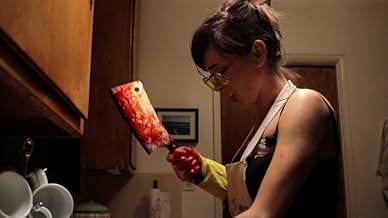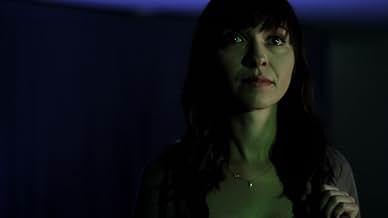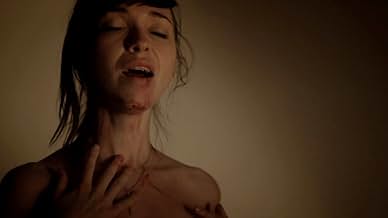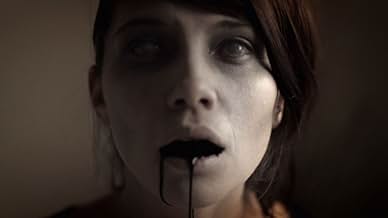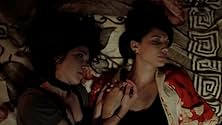CALIFICACIÓN DE IMDb
5.4/10
3.3 k
TU CALIFICACIÓN
Tras empujar a su amiga desde un tejado, Alyce se sumerge en una violenta pesadilla de sexo, drogas y autodestrucción, en la que su mente llena de culpa se destruye a sí misma y a los demás.Tras empujar a su amiga desde un tejado, Alyce se sumerge en una violenta pesadilla de sexo, drogas y autodestrucción, en la que su mente llena de culpa se destruye a sí misma y a los demás.Tras empujar a su amiga desde un tejado, Alyce se sumerge en una violenta pesadilla de sexo, drogas y autodestrucción, en la que su mente llena de culpa se destruye a sí misma y a los demás.
- Dirección
- Guionista
- Elenco
Amara Zaragoza
- Carroll
- (as Tamara Feldman)
Catero Alain Colbert
- Mouse
- (as Catero Colbert)
Max E. Williams
- Kurt
- (as Max Williams)
- Dirección
- Guionista
- Todo el elenco y el equipo
- Producción, taquilla y más en IMDbPro
Opiniones destacadas
After accidentally knocking her best friend off a roof, Alyce (Jade Dornfeld) is haunted by guilt and delves into a brutal nightmare wonderland of sex, drugs and violence, her mind tearing itself apart along with anyone else who gets in her way.
As others have mentioned, trying to put this film into any one genre is pretty challenging. The marketers seem to want this to be a ghost story, but that is a very small part of what really happens. Following Alyce's journey is not horror, but something a little more than drama.
The attempt to draw from "Alice in Wonderland" is strange. Clearly we have "Alyce" and her friend "Carroll Lewis", which are obvious references. We even have James Duval, who will be known by many as playing a rabbit in "Donnie Darko" (though his character here is anything but Alyce's guide). And there the similarities end.
Director Jay Lee has moved up in the world from his days (not long ago) making "Zombie Strippers". Much of this is a "really satisfying slow burn" (in the words of Nikki Hopeman), but has more to offer than just well-paced suspense. Others have made interesting comparisons, with Chuck Bowen labeling it "a blunt, trashy fusion of 'Repulsion' and 'Bartleby, the Scrivener'." Brian Tallerico was reminded of "great films like 'Repulsion' and 'May'". Unlike these two, I did not see the "Repulsion" connection, but that is a high praise.
Bowen says the film "is distinctive because Lee doesn't invite us to sympathize with Alyce; she isn't a doomed wallflower in the tradition of the heroes of Carrie, May, or many others". Quite true -- she is no hero or anti-hero, but merely the protagonist we follow, whether her path is justified or not, sane or insane. And that makes it a stronger film.
As others have mentioned, trying to put this film into any one genre is pretty challenging. The marketers seem to want this to be a ghost story, but that is a very small part of what really happens. Following Alyce's journey is not horror, but something a little more than drama.
The attempt to draw from "Alice in Wonderland" is strange. Clearly we have "Alyce" and her friend "Carroll Lewis", which are obvious references. We even have James Duval, who will be known by many as playing a rabbit in "Donnie Darko" (though his character here is anything but Alyce's guide). And there the similarities end.
Director Jay Lee has moved up in the world from his days (not long ago) making "Zombie Strippers". Much of this is a "really satisfying slow burn" (in the words of Nikki Hopeman), but has more to offer than just well-paced suspense. Others have made interesting comparisons, with Chuck Bowen labeling it "a blunt, trashy fusion of 'Repulsion' and 'Bartleby, the Scrivener'." Brian Tallerico was reminded of "great films like 'Repulsion' and 'May'". Unlike these two, I did not see the "Repulsion" connection, but that is a high praise.
Bowen says the film "is distinctive because Lee doesn't invite us to sympathize with Alyce; she isn't a doomed wallflower in the tradition of the heroes of Carrie, May, or many others". Quite true -- she is no hero or anti-hero, but merely the protagonist we follow, whether her path is justified or not, sane or insane. And that makes it a stronger film.
What is this movie about? It's about a chick who goes crazy. Or---who was not right in the head in the first place and circumstances pushed her over the edge.
The first part of the movie has Alyce and her best friend Carroll out on the street late at night. They're both drunk having a public heart-to-heart. Why? After meeting up with her boyfriend earlier at a bar, Carroll found out her boyfriend Vince is cheating on her. Later, they arrive at Alyce's place and consider making out (sorry guys, that went nowhere). Then Carroll suggest that they go out and get drugs. This they do. Later Carroll winds up in a hospital. All of this eats up about 20 mins of the movie. The next part is about how Alyce copes with her sense of guilt. She's a nervous wreck and seeing things. The movie seemed like a ghost story at this point to me. To help her cope, Alyce goes back to the same drug dealer she and Carroll went to earlier to buy drugs. Her behavior gets even weirder.
The movie is about a hour and a half. By the last half hour Alyce has totally flipped and the movie doesn't appear to be a ghost story anymore but about a psycho bitch. The ending is so over-the-top in terms of the story and violence, that it becomes a kind of "horror comedy" whereas earlier it seemed like a serious offbeat psychological thriller. Finally, all I can say about this movie is that it's a curious mix of style and content. Subject matter includes: drugs, drunkenness, masturbation, necrophilia, rough sex, butchery (only the last item was explicit). As far as the style goes, it seemed light at first (where's this thing going?), then serious (Damn!), then both light and serious (Huh?) Love, Boloxxi.
The first part of the movie has Alyce and her best friend Carroll out on the street late at night. They're both drunk having a public heart-to-heart. Why? After meeting up with her boyfriend earlier at a bar, Carroll found out her boyfriend Vince is cheating on her. Later, they arrive at Alyce's place and consider making out (sorry guys, that went nowhere). Then Carroll suggest that they go out and get drugs. This they do. Later Carroll winds up in a hospital. All of this eats up about 20 mins of the movie. The next part is about how Alyce copes with her sense of guilt. She's a nervous wreck and seeing things. The movie seemed like a ghost story at this point to me. To help her cope, Alyce goes back to the same drug dealer she and Carroll went to earlier to buy drugs. Her behavior gets even weirder.
The movie is about a hour and a half. By the last half hour Alyce has totally flipped and the movie doesn't appear to be a ghost story anymore but about a psycho bitch. The ending is so over-the-top in terms of the story and violence, that it becomes a kind of "horror comedy" whereas earlier it seemed like a serious offbeat psychological thriller. Finally, all I can say about this movie is that it's a curious mix of style and content. Subject matter includes: drugs, drunkenness, masturbation, necrophilia, rough sex, butchery (only the last item was explicit). As far as the style goes, it seemed light at first (where's this thing going?), then serious (Damn!), then both light and serious (Huh?) Love, Boloxxi.
With a cursory acknowledgment of the Lewis Carrol tale, Alyce is as much an entry-level clerical answer to the Fortune 500 American Psycho (2000), as it is a morbid odyssey of self discov- uh, make that self-destruction. Like a high-speed bullet train to Hell, Alyce Kills is novel, slick, and exciting, but it doesn't take us where we want to go.
Young, pert Alyce (Jade Dornfeld) toils away in a depressing corporate cubicle for a shrewish boss at a thankless job. After work she trudges home to her cramped apartment to freshen up before some much needed steam-venting at dingy nightclubs. It's not much of a life, but Alyce has her friend Danielle (Rena Owen), an alpha female who provides Alyce with a framework of guidance upon which follower Alyce proves to be reliant.
When Alyce and Danielle take the Generation X drug "ecstasy," Danielle sexually leads on Alyce. It comes out that Alyce has a crush on Danielle who then rejects her.
Is it an accident then when Alyce "accidentally" pushes her off the roof a short while later? It's not clear whether Alyce is vindictive and a little crazy, or merely reckless, and irresponsible. Danielle stands on the ledge, tempting fate, Alyce mock-pushes her. Alyce is playing a game and behaves as if she doesn't intend the result -Danielle's dive to the pavement. But Alyce definitely intends to make contact, and under the circumstances it's no surprise when Danielle plunges to her doom.
Despite that it led to tragedy, Alyce decides she likes ecstasy and trades sex for the drug from a repulsive dealer. Under the influence of the psychedelic, Alyce locks herself in her apartment for marathon-length trips during which she perpetually masturbates to violent videos. Conniving to obfuscate her complicity in Danielle's misfortune leads Alyce to take increasing risks until she pulls out all the stops. Traipsing across an urban landscape of bizarre characters, settings and situations, Alyce taunts the family of her victim, and eventually conspires bloody murder against those who annoy and inconvenience her.
Having now lost Danielle's boundary-defining structure, Alyce's fragile veneer of sanity falls away like an uncoupled caboose from a speeding express. Her locomotive throttle is wide open and there's no engineer in the cab. Alyce resolves to take charge of her own life, but her brand of self-assertive, feminist "empowerment" is to embark upon a self-indulgent journey of risky behavior. Yet it's more like a spree, and it degenerates into a maelstrom of self destruction, dragging those closest to her along for a hell-ride on her crazy train.
The theme of women scheming against men has been around at least since ancient Greece. From Aristophanes' Lysistrata, to the Biblical Eve convincing Adam to bite the proverbial apple, we've seen versions of the femme fatale in various literary incarnations through the ages. A few include Shakespeare's Lady Macbeth, and Cleopatra, Daniel Defoe's opportunistic Moll Flanders, Oliver Goldsmith's lighthearted, scheming, Katie Hardcastle in his 1773 play, She Stoops To Conquer, the conniving Matilda in Matthew Gregory's 1796 supernatural Gothic novel The Monk: A Romance, and the malevolent man-hater, Miss Havisham in Charles Dickens' Great Expectations.
Whereas these feminine plotters employed cunning and sexual manipulation to achieve their aims, their modern counterparts resort to brute force. The concept of the fairer sex outwitting men has evolved into the myth of womens' domination over men, and convoluted orchestrations have given way to the karate kicks and machine guns used by characters such as secret agent Emma Peel (Diana Rigg; Uma Thurman in the 1998 film version) in BBC's The Avengers, to Max Guevera (Jessica Alba) in TV's Dark Angel, and La Femme Nikita (Anne Parillaud; Bridget Fonda in the US remake). The latest trend has dark-psyched vixens engaging in just plain psychopathic killing sprees.
Alyce's quirky, but undeveloped character may be inspired by the leads in May (2002), and Neighbor (2009), two similar stories about loner hellcats who indulge their necrophilic and cannibalistic urges through acts of violence. Yet May (Angela Bettis), the film's namesake, commits her violence via a misguided search for an similarly misfit mate. In Neighbor, "The Girl," (America Olivo) thrill-kills for the sheer sadistic pleasure of it, making a living by robbing her victims and using their homes like motels.
Alyce however, lacks any sensible or even cognizant motivation at all. Her deeds defy logic, her methods are unsound, and Alyce's lack of planning is sure to bring her only more trouble. We're not sure if even she understands her actions. This makes her singularly one dimensional.
It's a profound disappointment, too. What's engrossing about Alyce's sexy character is not what she does, but the wry way she does it with her distinctively iconoclastic demeanor. It's not the revulsion inherent to her wanton acts of sex and violence that catches our attention, but the manner in which her smug, witty bearing holds out the promise of a satisfying payoff. We keep waiting to tumble into an epiphany of insight into her disturbed psyche, or at least some commentary about human nature or revenge. It never happens, and we're left feeling like the lone passenger on a runaway train with no destination in sight, and no emergency pull-cord to stop the projector.
Young, pert Alyce (Jade Dornfeld) toils away in a depressing corporate cubicle for a shrewish boss at a thankless job. After work she trudges home to her cramped apartment to freshen up before some much needed steam-venting at dingy nightclubs. It's not much of a life, but Alyce has her friend Danielle (Rena Owen), an alpha female who provides Alyce with a framework of guidance upon which follower Alyce proves to be reliant.
When Alyce and Danielle take the Generation X drug "ecstasy," Danielle sexually leads on Alyce. It comes out that Alyce has a crush on Danielle who then rejects her.
Is it an accident then when Alyce "accidentally" pushes her off the roof a short while later? It's not clear whether Alyce is vindictive and a little crazy, or merely reckless, and irresponsible. Danielle stands on the ledge, tempting fate, Alyce mock-pushes her. Alyce is playing a game and behaves as if she doesn't intend the result -Danielle's dive to the pavement. But Alyce definitely intends to make contact, and under the circumstances it's no surprise when Danielle plunges to her doom.
Despite that it led to tragedy, Alyce decides she likes ecstasy and trades sex for the drug from a repulsive dealer. Under the influence of the psychedelic, Alyce locks herself in her apartment for marathon-length trips during which she perpetually masturbates to violent videos. Conniving to obfuscate her complicity in Danielle's misfortune leads Alyce to take increasing risks until she pulls out all the stops. Traipsing across an urban landscape of bizarre characters, settings and situations, Alyce taunts the family of her victim, and eventually conspires bloody murder against those who annoy and inconvenience her.
Having now lost Danielle's boundary-defining structure, Alyce's fragile veneer of sanity falls away like an uncoupled caboose from a speeding express. Her locomotive throttle is wide open and there's no engineer in the cab. Alyce resolves to take charge of her own life, but her brand of self-assertive, feminist "empowerment" is to embark upon a self-indulgent journey of risky behavior. Yet it's more like a spree, and it degenerates into a maelstrom of self destruction, dragging those closest to her along for a hell-ride on her crazy train.
The theme of women scheming against men has been around at least since ancient Greece. From Aristophanes' Lysistrata, to the Biblical Eve convincing Adam to bite the proverbial apple, we've seen versions of the femme fatale in various literary incarnations through the ages. A few include Shakespeare's Lady Macbeth, and Cleopatra, Daniel Defoe's opportunistic Moll Flanders, Oliver Goldsmith's lighthearted, scheming, Katie Hardcastle in his 1773 play, She Stoops To Conquer, the conniving Matilda in Matthew Gregory's 1796 supernatural Gothic novel The Monk: A Romance, and the malevolent man-hater, Miss Havisham in Charles Dickens' Great Expectations.
Whereas these feminine plotters employed cunning and sexual manipulation to achieve their aims, their modern counterparts resort to brute force. The concept of the fairer sex outwitting men has evolved into the myth of womens' domination over men, and convoluted orchestrations have given way to the karate kicks and machine guns used by characters such as secret agent Emma Peel (Diana Rigg; Uma Thurman in the 1998 film version) in BBC's The Avengers, to Max Guevera (Jessica Alba) in TV's Dark Angel, and La Femme Nikita (Anne Parillaud; Bridget Fonda in the US remake). The latest trend has dark-psyched vixens engaging in just plain psychopathic killing sprees.
Alyce's quirky, but undeveloped character may be inspired by the leads in May (2002), and Neighbor (2009), two similar stories about loner hellcats who indulge their necrophilic and cannibalistic urges through acts of violence. Yet May (Angela Bettis), the film's namesake, commits her violence via a misguided search for an similarly misfit mate. In Neighbor, "The Girl," (America Olivo) thrill-kills for the sheer sadistic pleasure of it, making a living by robbing her victims and using their homes like motels.
Alyce however, lacks any sensible or even cognizant motivation at all. Her deeds defy logic, her methods are unsound, and Alyce's lack of planning is sure to bring her only more trouble. We're not sure if even she understands her actions. This makes her singularly one dimensional.
It's a profound disappointment, too. What's engrossing about Alyce's sexy character is not what she does, but the wry way she does it with her distinctively iconoclastic demeanor. It's not the revulsion inherent to her wanton acts of sex and violence that catches our attention, but the manner in which her smug, witty bearing holds out the promise of a satisfying payoff. We keep waiting to tumble into an epiphany of insight into her disturbed psyche, or at least some commentary about human nature or revenge. It never happens, and we're left feeling like the lone passenger on a runaway train with no destination in sight, and no emergency pull-cord to stop the projector.
Decent thriller w little dark comedy .Lead charac ter does a great job as a obsessed friend who goes off the rails.
What happens when an otherwise normal, possibly even boring and plain, girl lose her marbles and go crazy? Well, that is basically what "Alyce" is about.
The movie starts out fairly slow, letting you get to know the two best friends Alyce (played by Jade Dornfeld) and Carroll (played by Tamara Feldman). When Carroll finds out that her boyfriend is cheating on her, she takes Alyce with her and goes drinking and take some drugs. Ending up on top of a building, tragedy strikes when Carroll is accidentally pushed over the ledge by Alyce, as a freak accident. From there on, Alyce goes into denial and starts to escape from reality by sorting to using drugs, ending up in a violent world of drug dealers and having to deal with a drug-induced reality.
For a movie of this sort, then "Alyce" was a bit tame. Sure the movie had its moments, but personally I found the constant flood of flashed images of a dead Carroll was a bit too much, and it was starting to become irritating. What was working in the movie, though, was the way it was shot and put together, because following Alyce's delve down into madness, it was like being there with her. However, there are better movies out there in the same category, and such examples of that would be "May" or "She's Crushed".
Don't get me wrong, "Alyce" is not a bad movie, but it was just lacking something extraordinary to make the movie memorable and stand out. It is great the first time around when you watch it, but I don't believe that this movie has enough contents to support being watched a second time. It was, however, an interesting approach to the movie that the director, Jay Lee, took, going from what seemed would be a movie about Alyce being haunted by her guilt (and seeing her dead friend constantly) to a movie about drug use and slipping into a broken down mental state. Thumbs up for that twist, though.
The acting in the movie was actually quite good, and Jade Dornfeld (playing Alyce) was actually doing it really great in her lead role, and she was carrying the movie, definitely. Also quite noticeable was Eddie Rouse (playing Rex the drug dealer).
The way that the movie ended was just priceless. I loved that ending, and it actually made it worth sitting through.
The movie starts out fairly slow, letting you get to know the two best friends Alyce (played by Jade Dornfeld) and Carroll (played by Tamara Feldman). When Carroll finds out that her boyfriend is cheating on her, she takes Alyce with her and goes drinking and take some drugs. Ending up on top of a building, tragedy strikes when Carroll is accidentally pushed over the ledge by Alyce, as a freak accident. From there on, Alyce goes into denial and starts to escape from reality by sorting to using drugs, ending up in a violent world of drug dealers and having to deal with a drug-induced reality.
For a movie of this sort, then "Alyce" was a bit tame. Sure the movie had its moments, but personally I found the constant flood of flashed images of a dead Carroll was a bit too much, and it was starting to become irritating. What was working in the movie, though, was the way it was shot and put together, because following Alyce's delve down into madness, it was like being there with her. However, there are better movies out there in the same category, and such examples of that would be "May" or "She's Crushed".
Don't get me wrong, "Alyce" is not a bad movie, but it was just lacking something extraordinary to make the movie memorable and stand out. It is great the first time around when you watch it, but I don't believe that this movie has enough contents to support being watched a second time. It was, however, an interesting approach to the movie that the director, Jay Lee, took, going from what seemed would be a movie about Alyce being haunted by her guilt (and seeing her dead friend constantly) to a movie about drug use and slipping into a broken down mental state. Thumbs up for that twist, though.
The acting in the movie was actually quite good, and Jade Dornfeld (playing Alyce) was actually doing it really great in her lead role, and she was carrying the movie, definitely. Also quite noticeable was Eddie Rouse (playing Rex the drug dealer).
The way that the movie ended was just priceless. I loved that ending, and it actually made it worth sitting through.
¿Sabías que…?
- TriviaThe titular character is named Alyce(Alice) and her best friend is named Carol Lewis (Lewis Carroll in reverse). Lewis Carroll wrote the novel Alice in Wonderland about a girl going down a rabbit hole, much like how Alyce descends into madness due in part to Carol Lewis.
- ConexionesReferences Casablanca (1942)
- Bandas sonorasCrazy Loco
Written by Nate Hertweck & David Bowick
Performed by Ocelot Robot
Wood and Lead (ASCAP)/Razorface (ASCAP)
Selecciones populares
Inicia sesión para calificar y agrega a la lista de videos para obtener recomendaciones personalizadas
- How long is Alyce Kills?Con tecnología de Alexa
Detalles
- Fecha de lanzamiento
- País de origen
- Sitios oficiales
- Idioma
- También se conoce como
- Alicia
- Locaciones de filmación
- Productoras
- Ver más créditos de la compañía en IMDbPro
- Tiempo de ejecución1 hora 30 minutos
- Color
- Relación de aspecto
- 1.85 : 1
Contribuir a esta página
Sugiere una edición o agrega el contenido que falta

Principales brechas de datos
By what name was Alyce (2011) officially released in India in English?
Responda


